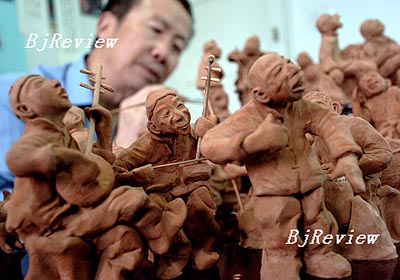|

Most of us are attracted by some aspect of China's traditional handcrafts, whether it be sugar figurines, paper cuts or shadow puppets, but little is known about the deeper meaning of these art forms and that these and other cultural aspects of Chinese life may soon be lost for ever, only existing in people's memories.
"Almost each minute, one kind of Chinese folk art disappears," said Feng Jicai, Chairman of the China Folk Literature and Art Society.
Feng is not being alarmist. As most Chinese folk art forms, also known as intangible cultural heritage, passed on from ancestors via oral instruction, the continuation of these traditional skills depends completely on successors. But most folk artists in China are already in their 70s or 80s, many have passed away, a major threat to the survival of folk arts.
"Before I had completely grasped the skills of making good bows, exclusively mastered by my father, he died," said Yang Fuxi regretfully. He is the 10th generation of successors of the Juyuanhao, a 290-year-old archery store in Beijing.
Such stories are common across China, causing great concern among older skilled artisans. With China moving toward an aging society, intangible cultural heritage has also entered a period of dying out, said Liu Xicheng, a member of the program of safeguarding intangible cultural heritage in China.
He cites an example of shadow puppetry in east Gansu Province, who's repertoire has declined rapidly from more than 100 plays in the early 1950s to only 20 today.
Fan Zhengan is another example. As the only inheritor of the art of shadow puppets in Shandong Province, which requires only one performer to produce all the sounds and manipulation of the puppets, Fan has long been worried about the future of his art. "The one-man shadow puppet play has a history of over 1,000 years, and when I am gone, the skill goes with me," he said.
The endangered future of these ancient art forms has recently awakened the awareness of the Central Government and the public of China. A national law on protection of intangible cultural heritage has now been drafted in China. Along with this, some provinces have also promulgated local regulations to protect folk arts, cultural traditions and customs in their regions.
On June 9 this year, 266 representative folk artisans were included in the list of the first batch of China's national level intangible cultural heritage issued by the Chinese Ministry of Culture.
Of the 266 listed fork artisans, Lin Bangdong, a fourth generation paper-cutter in Leqing, Zhejiang Province (unique in that he uses a special knife, not scissors, to cut), is one of them.
The 81-year-old Lin has dedicated himself to this art for 67 years. Fortunately for him, his son and grandson have also learned the skill along with a dozen young paper-cut students.
Although the Central Government has taken various measures to protect disappearing intangible cultural heritage, the situation is still not optimistic. This is partly because of social modernization and globalization trends, said Tian Qing, Director of the Intangible Cultural Heritage Research Center of China.
"Everyone is now caught up in the virtual world and young people in many countries have similar modern interests. All this impedes ongoing interest in traditional cultural activities," said Tian.
He predicts that if endangered folk arts are not protected in time, they will disappear in the next 10 years.
Tian is echoed by many folk artists in China. "In our current society, less adults have enough patience to appreciate the appeal of traditional folk art, not to mention the youth," said Zhong Dongsheng, a craftsman who has made miniature mud figurines for 30 years.
Having the same concern, many protectionists of traditional Chinese culture also call for the details of Chinese intangible cultural heritage to be included in the elementary and middle school textbooks.
Currently, the good news is that China is now carrying out a plan to subsidize folk artisans, which will help them to pass on their skills, according to Tian.
Shadow puppeteer Fan will be a beneficiary. The local government has drawn up a special five-year protection plan for him, which includes financial aid and a training plan to pass on his skills to 10 students.
Greatly encouraged by the government support, Fan is determined to create some new shows to adapt to the more modern tastes of younger audiences. "I have been invited to perform shadow puppets for college students, and they love it very much. So I think if we have new content and keep the traditional performance style, our audience will expand," said Fan.
And along with the efforts of the government, some unofficial organizations have also joined the culture protection work. Feng's China Folk Literature and Art Society is now busy with a program that will create a database of folk art masters in China and fund them through various channels.
"Passing on culture is the responsibility of the whole society. Only if every one of us can care and treasure the rich cultural heritage left by our ancestors, can the unique tradition and spirit of our nation will be maintained. It needs the joint effort of the entire nation," said Feng. |